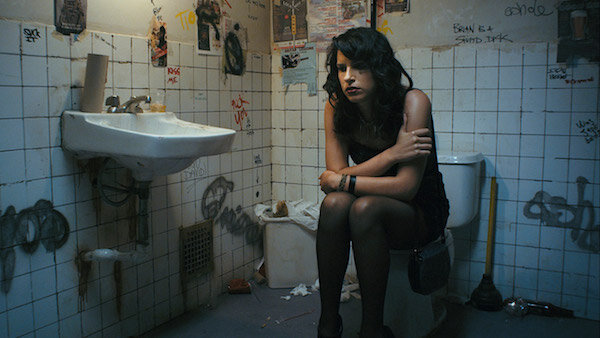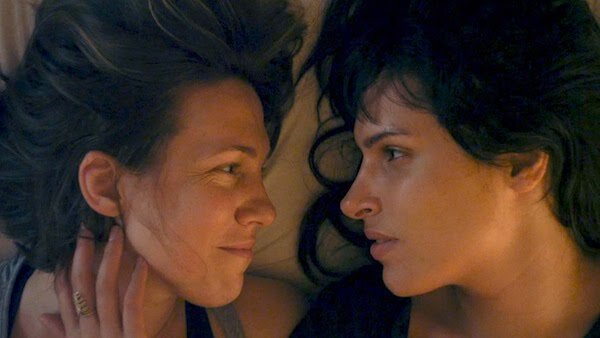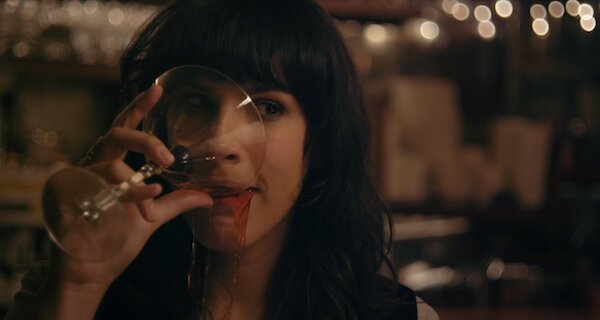Some films come along precisely when you need them. This is what happened for Mara Tatevosian when she watched Appropriate Behavior for the first time and saw Desiree Akhavan holding up a mirror to her life in return. This Valentine’s Day, one writer pens an essay to the woman who helped her grow into herself.
Early this year, Kate McKinnon honoured Ellen Degeneres at the Golden Globes. In her speech, McKinnon generously told the world that Ellen had given her “a sense of self,” explaining that her sitcom offered a beacon for young gay girls trying to navigate the world. How coming to terms with a sexuality that isn’t heteronormative is a fearsome endeavour, often kept secret.
I frequently think of the women who have made me feel visible. Ellen certainly wasn’t on that list – perhaps because I've never seen her sitcom, or perhaps because she looks, acts, and sounds nothing like me. Queer representation is scarce, and generational gaps are prevalent. Ellen’s experiences did not align with mine, and as I searched for someone whose experiences did, I felt a sense of despair, wishing I had someone to look to. Someone who understood what it was like to grow up with parents who weren’t from America, what it means to navigate two worlds: the American one, and the one I am native to. Someone who knew the lifelong attempt at assimilation to Western habits, while secretly clinging onto centuries of familial tradition. A person familiar with that perpetual feeling of discomfort, which stems from creating distance from native traditions and adopting foreign ones thousands of miles away from the people who raised you. The horrible, scary secret McKinnon spoke of is so much scarier when it introduces a third world to battle through. It challenges you to be the proper child of Middle Eastern immigrants in a post-9/11 America, and also a gay woman.
In recent years, I had developed three senses of self– the gay one, the American one, and the Persian Armenian one. I spent long, lonesome hours listening to the music of my home; eating my grandmother’s ghormeh sabzi and polo; and learning our celebratory dances in secret. The films I watched spoke in whispers, only caressing parts of my identity. I became accustomed to finding fractions of myself in those films, and collected characters as if they were costumes. I was okay with not having an Ellen – but then Desiree Akhavan made a movie.
A friend of mine mentioned Appropriate Behavior, confident that I’d already seen it. I hadn’t even heard of it.“It’s literally the story of your life,” he said.
How I wish I had gone home and watched it that night, but I waited a year. I was scared that it wouldn’t be the story of my life, and I’d be let down again. That I would step into adulthood still feeling fragmented. After watching Akhavan’s feature debut, my understanding of my identity ignited a new desire to tell stories, because they suddenly held validity. Akhavan had taken that perpetual discomfort, and turned it into a movie. For the first time, the characters on screen weren’t broken parts of myself, but they were whole images of me, my parents, my family, my culture. For a brief moment, I felt the sense of bravery I had been yearning for since childhood.
In the film, Shirin stares blankly while her brother, a doctor, makes jokes about her inability to find work with a Masters degree in Journalism. She’s visiting her family for tea, which is closer to an event than a drink. When Persians have chai, a large coffee table is coated with an assortment of desserts and fruits – none of which are ever actually eaten. The food is merely a buffer for the conversations no one wants to have, and usually the daughter of the family is subject to questioning. “How’s your love life? Any boys we should know about?,” her father asks, jokingly. He isn’t asking because he knows she’s queer, he’s asking because in his eyes, she’s been single her entire adult life. To him, the joke lies in her loneliness. In fairness, she is lonely – she’s been through a miserable breakup, but her family knows nothing about because it was with a woman.
Appropriate Behaviour acknowledges that being closeted is a towering part of the queer identity, but it’s also observant of priviledged queer communities that lack in self-awareness. It calls attention to the irony of reading expansive books on oppressive regimes while being imperceptive to the intimate realities of them. In a flashback, Maxine, Shirin’s ex-girlfriend, questions her decision to remain in the closet. “I’m sorry, what country is it that you get stoned to death if you’re convicted of being gay?” Shirin asks. “Oh, yeah. Wait, I know. It’s Iran. The country that my entire family comes from,” she says, only half joking.
Although Iran has complex laws around homosexuality, Amnesty International estimates that 5,000 members of the LGBT community have been executed since the Iranian revolution in 1979. Shirin’s plea is dramatic, and asks for pity, but it rings true. Queer identity is often understood through experiences that don’t include voices of color. White queer women can seldom understand that specific layer of identity, because they are only operating under the social practices of western protocol. Sometimes – like Shirin – it’s easier to ask for sympathy instead of unpacking the harrowing feeling of knowing you’ll never truly be welcome in the country you’re from.
The film frames uncomfortable scenes with almost physical energy, as Shirin’s multiple worlds try to collide. In an attempt to share parts of her culture, Shirin takes Maxine to a Noruz party where the women are swallowed by thick, shiny eyeliner and have matching nose jobs; the men have so much gel in their hair it seems permanent; and Mohsen Namjoo plays as every Persian relative eats a saffron-infused appetiser.
“Isn’t it fantastic?” Shirin says with a smile on her face. She’s playing the role of an observer. After spending so much time removing herself from this world, it would feel wrong to take part in it. She’s brought her white girlfriend, a signifier of open queerness, to a party that asks Shirin to hide large parts of herself. Her simple black dress in a sea of brightly colored jeweled gowns; her natural hair juxtaposed with the elaborate updos most Persian women sport. She is merely visiting, for now.
“Mom, I’m a little bit gay,” Shirin says at Noruz, the following year. “No, you’re not,” she replies.
The harsh juxtaposition of her past relationship with the powerful presence of her cultural roots force Shirin’s incompatible identities to find a balance, and binds them together. The cyclical nature of this story is where the cordial familiarity lies. It begins and ends with Noruz and a train to Brooklyn.
Akhavan’s film offers proof that no amount of Americanisation, oppressive regimes, and generational gaps can cut the ties we have to our foods, our music, our dancing – they hold a gravity that is only understood amongst one another. But being gay doesn't fall into the Persian agenda. So we stand from a distance in Brooklyn, or Silverlake, or any other gentrified city neighborhood, and watch our family members exist in the depths of our cultural heritage. Though finding refuge in queer hipster neighborhoods doesn't make us any less Persian, it certainly doesn't clarify what it means to be a good gay person. How can you be a good anything when you’re struggling to stay afloat? Working too many jobs, worrying about the future, and not having enough money to do anything about it?
When I left home, people accused me of being ashamed of my culture. What I couldn’t explain was that I loved my culture so much, that I was willing to fold myself in order to be good enough for it. Even now, it seems impossible. Impossible to explain the loneliness of existing in limbo. Desiree Akhavan understands the nuances of this identity. She understood it when she took her white, Brooklynite girlfriend to Noruz, where she shared her style of dance and music and food. She also understood it when she included the detail about who gets custody over a strap-on after a breakup. As a queer woman, Akhavan is always standing from a distance to the Iranian world, perhaps out of shame, or fear of being shamed.
I think about how I’ve distanced myself too, as I write this in my bedroom 3,000 miles away from my family, only texting them occasionally. I think about how difficult it is to watch Shirin’s coming out scene because it resembles mine – quiet, reflective, and isolated. Slowly, I’m learning to unpack my full identity and share it without remorse. I sympathise with McKinnon’s sentiment towards Ellen – that without her, she would have spent the rest of her youth confused and angry. I came out of the closet almost seven years ago, but only see now that Desiree Akhavan is my Ellen.
Mara Tatevosian (@maratatev) is a filmmaker and radio host based in Los Angeles and Boston. She's incapable of watching movies without crying and has ventured into writing about them too.
Our DESIREE AKHAVAN t-shirt is available to purchase here. Proceeds go towards paying our writers and supporting female-led film projects.




